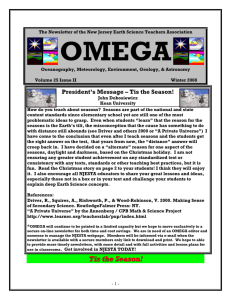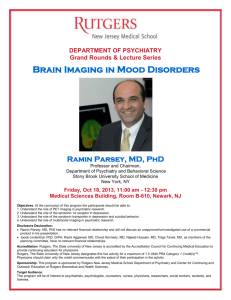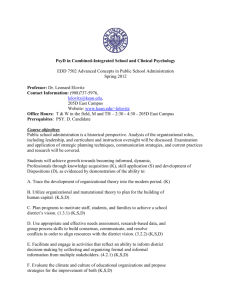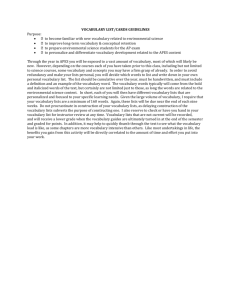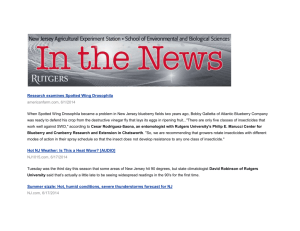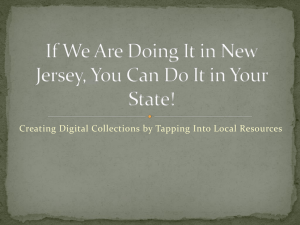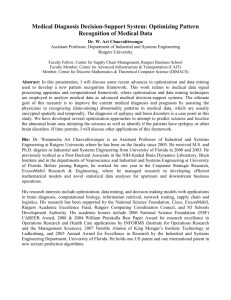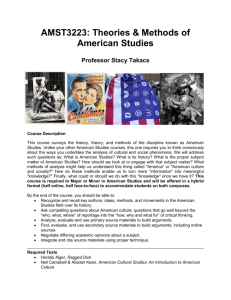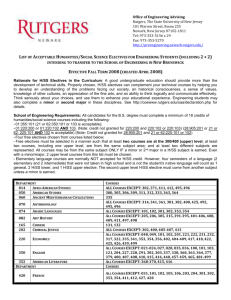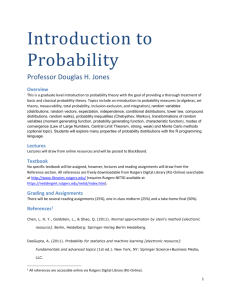Fall 2007
advertisement
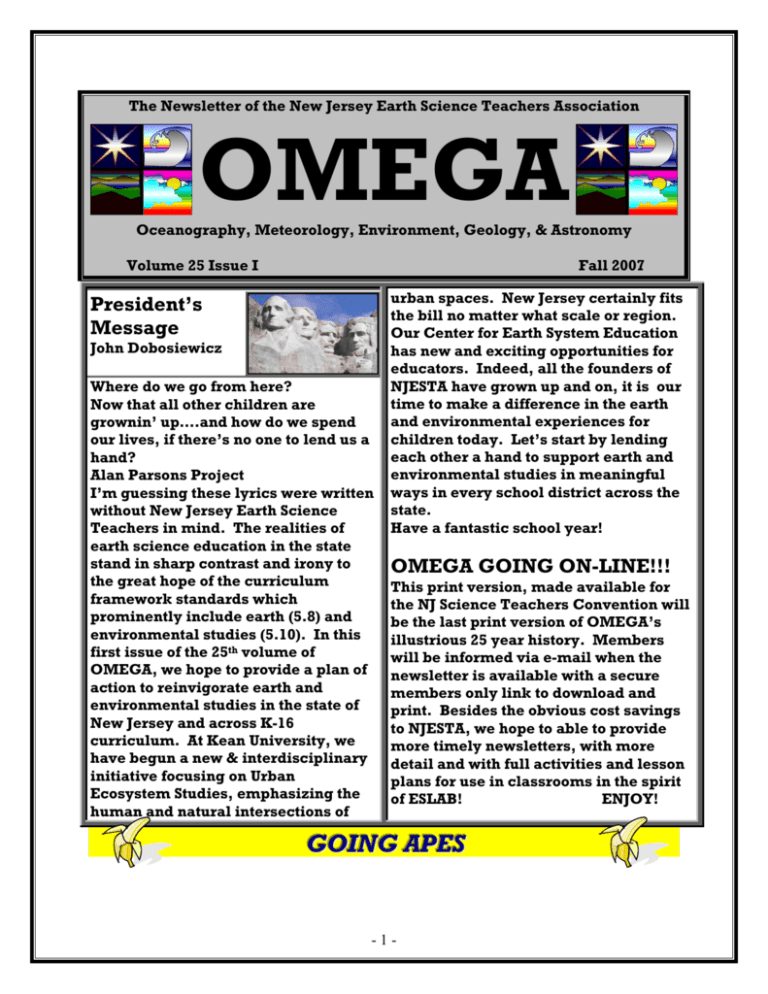
The Newsletter of the New Jersey Earth Science Teachers Association OMEGA Oceanography, Meteorology, Environment, Geology, & Astronomy Volume 25 Issue I Fall 2007 President’s Message John Dobosiewicz Where do we go from here? Now that all other children are grownin’ up….and how do we spend our lives, if there’s no one to lend us a hand? Alan Parsons Project I’m guessing these lyrics were written without New Jersey Earth Science Teachers in mind. The realities of earth science education in the state stand in sharp contrast and irony to the great hope of the curriculum framework standards which prominently include earth (5.8) and environmental studies (5.10). In this first issue of the 25th volume of OMEGA, we hope to provide a plan of action to reinvigorate earth and environmental studies in the state of New Jersey and across K-16 curriculum. At Kean University, we have begun a new & interdisciplinary initiative focusing on Urban Ecosystem Studies, emphasizing the human and natural intersections of urban spaces. New Jersey certainly fits the bill no matter what scale or region. Our Center for Earth System Education has new and exciting opportunities for educators. Indeed, all the founders of NJESTA have grown up and on, it is our time to make a difference in the earth and environmental experiences for children today. Let’s start by lending each other a hand to support earth and environmental studies in meaningful ways in every school district across the state. Have a fantastic school year! OMEGA GOING ON-LINE!!! This print version, made available for the NJ Science Teachers Convention will be the last print version of OMEGA’s illustrious 25 year history. Members will be informed via e-mail when the newsletter is available with a secure members only link to download and print. Besides the obvious cost savings to NJESTA, we hope to able to provide more timely newsletters, with more detail and with full activities and lesson plans for use in classrooms in the spirit of ESLAB! ENJOY! G GO OIIN NG GA AP PE ESS -1- Is your school offering AP Environmental Science (affectionately known as APES)? If not, they should be for a number of reasons. We don't need to preach to the choir (NJESTA members!) about how important APES is for the sustainability of our planet, but we do need to make sure our science supervisors and administrators know. Our newspapers are bulging with environmental articles on a daily basis, and therefore anyone who reads the paper is familiar with the global issues (climate change, increasing population, depleting resources), regional issues (infrastructure issues, state level pollution and energy issues), and local issues (water quality in our streams, superfund sites, brownfields). APES won't remove these issues, but it will help to create problem solvers and environmental leaders for tomorrow. Unbeknownst to our state education leaders, research has shown that colleges and the jobs of tomorrow will require that our students be able to integrate their thoughts. This will not be achieved through teaching domain specific courses such as biology, chemistry, and physics, but can be achieved through courses like Earth Science taught at a deeper level or from the APES course. A glance at the APES curriculum demonstrates how a course can be a combination of biology, chemistry, earth science, anthropology, social sciences, etc. My students are told in the beginning of the year that the students who will be the most successful in the course are those who can integrate their thoughts in problem solving. APES is for the creative teacher who is looking for time to offer projects such as debates, local studies, trips & speakers, unit challenges, and problembased learning, not to imply that there is little content to cover between September and June. The content of the course lends itself to creative modes of teaching, and the students gain so much more from these methods than from lectures. The type of students who take APES range in academic ability, but most have common an interest in the environment. Go to the College Board website (http://apcentral.collegeboard.com/apc/Controller.jpf) and check out the information posted about the APES course, and see if it's a fit for you, your students, and your school. My guess is that it is - Good Luck! Missy Holzer National Earth Science Teachers Association Secretary NJESTA Executive Committee NJSTA Liaison NJESTA Earth Science Teacher of the Year 2007 -2- National Earth Science Week (October 14-20, 2007) "Pulse of Earth Science" http://hurri.kean.edu/cese/ Ideas for how you can celebrate this event with your classes can be found on the AGI website: http://www.earthsciweek.org/ Check out the new website for the Center for Earth System Education at Kean University. Look for Round Table Earth in Spring 2008! Now more than ever we are teaching the most important subject on Earth! INSTITUTE FOR URBAN ECOSYSTEM STUDIES Celebrating National Earth Science at KEAN UNIVERSITY Week is a way to let everyone else now how vital our courses are to the The mission of the Institute for Urban sustainability of our planet. Ecosystem Studies (IUES) is consistent withthe overall mission of Kean Universityand its goal is to prepare EARTH SCIENCE @ KEAN students to thinkcritically and creatively so that they canadapt to DON’T FORGET!!!!! changing social, economic andtechnological conditions, 25th Annual NJESTA CONFERENCE particularly asthey pertain to urban Tentative Date: Saturday March 29, 2008 ecosystems. Themission statement of IUES emphasizesthat IUES provides a setting conducive tointerdisciplinary DEPARTMENT OF GEOLOGY & discourse that leads toinvestigations of METEOROLOGY both the basic andapplied aspects of urban ecology. By encouraging LOOK FOR GRADUATE COURSES IN community-based land stewardship SPRING AND SUMMER 2008! and environmental education and engaging in research in the http://hurri.kean.edu natural,applied and health sciences, IUES aims to further understand and foster the biodiversity of urban environmental -3- systems. Pulse of the Planet (Pulsetalks.org) This family-friendly Saturday series brings Rutgers University scientists to Liberty Science Center to teach you things you never knew about our planet’s dominant feature: the ocean. Learn about topics ranging from microscopic organisms to climate change in fun and lively discussions and demonstrations. A partnership between: Rutgers University, Institute of Marine & Coastal Sciences and LSC. Funded by the Geraldine R Dodge Foundation Educators Welcome: Following the lectures, K-12 educators will be invited to stay and participate in a two hour professional development workshops. Here you will get lesson plans and materials that will help you bring the ocean back to your classroom. Stay after the demonstrations to learn how you can take them back to your classroom and earn graduate credit from Rutgers University! Please pre-register for professional development! Pulse of the Planet strives to: 1) Increase understanding and awareness of the ocean sciences 2) Create opportunities for teachers to integrate the marine science content into their science and language arts lessons, and 3) Offer a bridge between the general public and practicing scientists with the goal of creating a greater understanding and appreciation for the impact of science in our lives. Mark your calendars for these important dates. Educators get professional development hours/credit. Graduate credit through online course available for a selected group, first come first served. October 27, 2007 10 am – 11 am Lecture Topic : Missing SINK: Carbon Dioxide and the Ocean Connection Dr. Elisabeth Sikes, Associate Professor Rutgers University Professional Development for K-12 Educators 11:00 am – 1:00 pm November 17, 2007 10 am -11 am The Sea You Can’t See: Microbes in the Ocean Dr. Jim Ammerman, Associate Research Professor, Rutgers University Professional Development for K-12 Educators 11:00 am – 1:00 pm We will focus on a new technology based program called the COOL Classroom (www.coolclassroom.org). This session which is geared to high school teachers, will offer $1500 stipends to participate in a pilot program of online resources. Pre-registration is required. January 26, 2008 10 am – 11 am Global Warming...It is Later than we Think… but not too Late! -4- Dr. Anthony Broccoli , Professor Rutgers University Professional Development for K-12 Educators 11:00 am – 1:00 pm February 16, 2008 10 am – 11 am Relationships in the Ocean Dr. Paul Jivoff, Assistant Professor Rider University Professional Development for K-12 Educators 11:00 am – 1:00 pm Kathy Johnston, our Artist in Residence, will lead an art class to encourage accurate observation and illustration of marine organisms. The class will focus on relationships and connections between organisms. Workshop will be limited to 20 teachers. Pre-registration required. March 8, 2008 10 am- 11 am Life on Other Planets? Dr. Paul Falkowski, Professor, Rutgers University Professional Development for K-12 Educators 11:00 am – 1:00 pm April 19, 2008 10 am- 11 am Our Networked Ocean World Dr. Scott Glenn, Professor Rutgers University Professional Development for K-12 Educators 11:00 am – 1:00 pm May 17, 2008 10 – 11 am Spring has Sprung!... in the Ocean Dr. Kay Bidle, Professor Rutgers University Professional Development for K-12 Educators 11:00 am – 1:00 pm Pre-registration is required. RUTGERS GEOLOGY MUSEUM The Rutgers University Geology Museum , which is open to the public, features exhibits on geology and anthropology, with an emphasis on the natural history of New Jersey. To arrange a group tour of the Geology Museum, pleas contact R. William Seldon at (732) 932-7243, or rwseldon@rci.rutgers.edu. There is no charge for admission and the museum even has a small rock shop! Visit the Dynamic Earth Exhibit Live or virtually! http://newarkmuseum.org Or take your students to a planetarium show Go to Collections Æ Natural Sciences Æ Dynamic Earth or Planetarium NJESTA EXECUTIVE BOARD 2007 President: John Dobosiewicz Kean University jdobosie@kean.edu -5- Members at Large NJSTA Liaison: Missy Holzer Chatham H.S. mholzer@monmouth.com Past President: Christopher Roemmele Chatham M.S. croems@comcast.net Membership: Kelley DeRosa Summit M.S. kderosa8@aol.com President-Elect: Vacant until 2008 Election Educational Outreach: Susan Petroulas Newark Museum spetroulas@newarkmuseum.org Secretary: Angela Best: Angieb738@hotmail.com Constitution Chair: Hope Kowalski-Porta Kinnelon H.S. kowalskih@optonline.net Treasurer: Christine Girtain Toms River H.S. Toms River cgirtain@trschools.com WebMaster: Christopher Duvall Chatham H.S. cduvall@chatham-nj.org Center for Earth Systems Education: Paul Croft Kean University pcroft@kean.edu Awards: Vacant OMEGA editor: John Dobosiewicz www.njesta.org -6-
